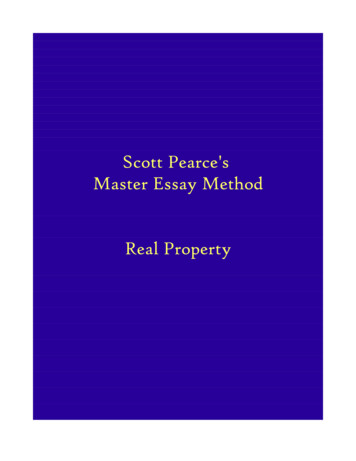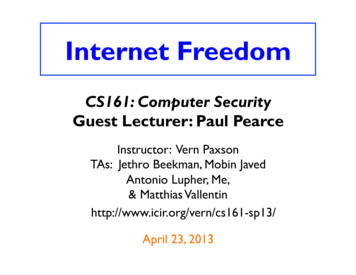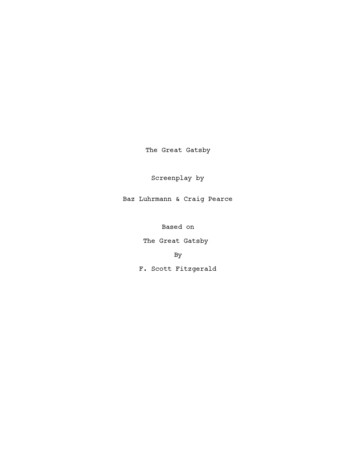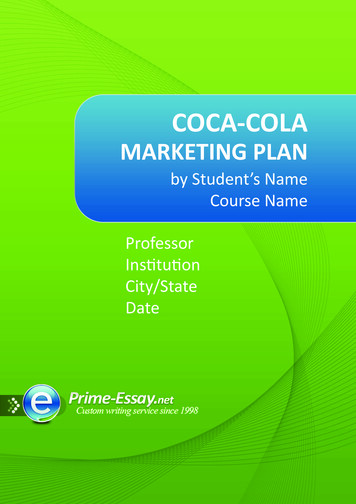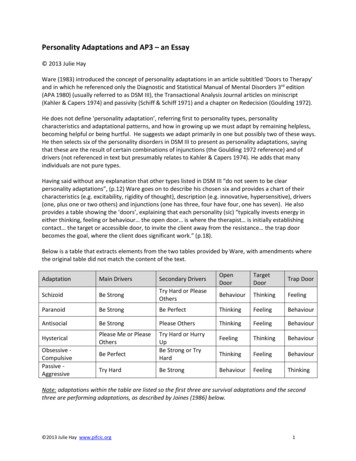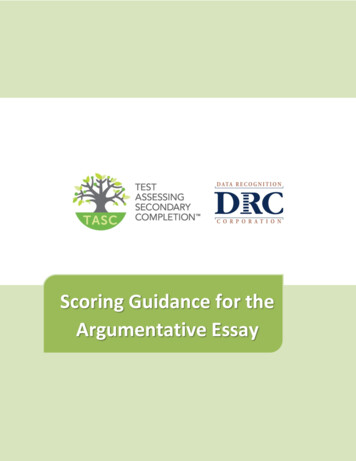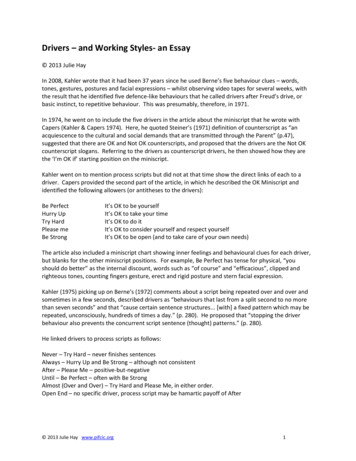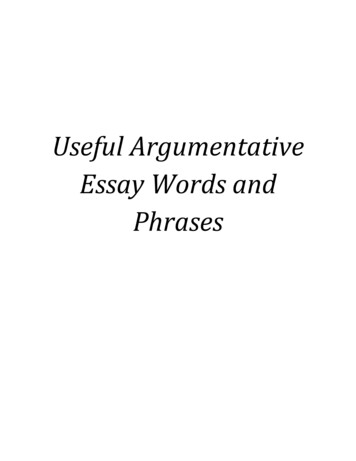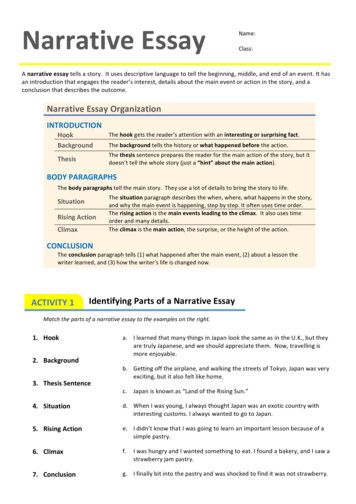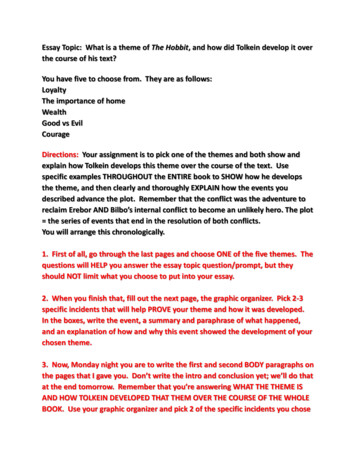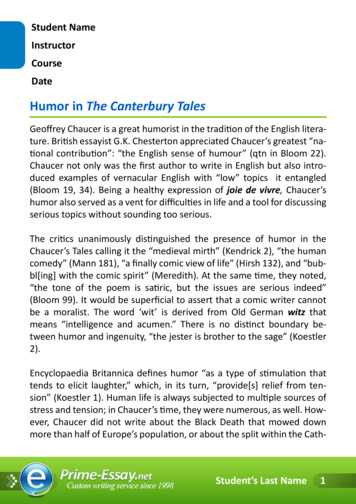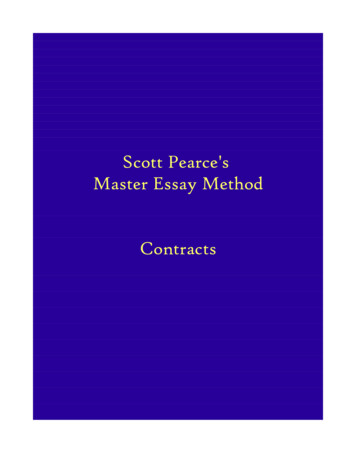
Transcription
Scott Pearce'sMaster Essay MethodContracts
CONTRACTS APPROACHMinimalist ApproachI.FormationII.Defenses to FormationIII.BreachIV.Defenses to ts Remedies: Reformation and RescissionD.Equity (Specific Performance)Defenses to RemediesElaborate ApproachA thoughtful applicant needs to make two decisions about any contracts question beforedoing the analysis:1.2.Does the common law or the Uniform Commercial Code apply?Which party is aggrieved? (Who is the "good guy" and who is "bad")Once you have decided these threshold issues, proceed to make a careful examination of thefacts through the following intellectual framework:Scott Pearce’s Master Essay Method - Contracts Approach
I.Formation: Is there a contract?A.Offer1.Intent of the offeror to be bound2.Content of the offera.b.c.d.3.II.Communication of offer to offereeB.AcceptanceC.Consideration: a bargained-for exchangeDefenses to FormationA.B.C.D.E.III.PartiesSubject MatterQuantityPriceIncapacityInfancyFraud / DuressStatute of FraudsMistakeTerms of the ContractA.Express TermsB.Implied Terms1.2.C.Prior DealingsCustom and UsageOral Contracts: Parol Evidence RuleScott Pearce’s Master Essay Method - Contracts Approach
IV.V.VI.Rights of Non Contracting PartiesA.Third Party Beneficiaries (vesting rules)B.Assignment of Rights may create third party beneficiaries.C.Delegation of Duties always creates third party beneficiaries.ConditionsA.Satisfaction of ConditionsB.Discharge of ConditionsC.Excuse of ConditionsBreachA.Minor Breach1.2.B.Material Breach1.2.C.Some performance, but less than substantial performanceRemedy: Damages or the right to cure, but no right to terminate theagreement.Total Breach - Two Caveats:1.2.VII.Substantial performance of the contract by the breaching partyRemedy: Contract price minus damagesDivisibilityRecissionDefenses to Breach - The most frequently tested on of PurposeModification / NovationScott Pearce’s Master Essay Method - Contracts Approach
VIII.RemediesA.Damages: contract price minus part performanceB.Restitution: payment for the benefit conferredC.Reformation: fix the contract1.2.3.D.Recission: cancel the contract1.2.E.Mistake that goes to the heart of the agreementFraud or misrepresentationEquity: Specific Performance1.2.3.4.5.IX.Mistake - either mutual or unilateralMisrepresentation - innocent or fraudulentDefenses to Reformationa.Lachesb.Sale to B.F.P.c.Parol Evidence RuleInadequate Legal RemedyDefinite and Certain ContractFeasibilityMutuality (no longer required in many jurisdictions)DefensesDefenses to RemediesA.B.C.D.E.Damages are SpeculativeDamages are Not ForeseeableFailure to Mitigate DamagesLachesUnclean HandsScott Pearce’s Master Essay Method - Contracts Approach
Contracts / RemediesCopyright February, 2010 – State Bar of CaliforniaIn 2001, Lou was the managing partner of Law Firm in State X and Chris was his paralegal. Realizingthat Chris intended to go to law school, Lou invited Chris and his father to dinner to discuss Chris’slegal career. Aware of Chris’s naive understanding of such matters, Lou, with the authority of LawFirm, made the following written offer, which Chris accepted orally:1) After graduation from law school and admission to the Bar, Law Firm willreimburse Chris for his law school expenses;2) Chris will work exclusively for Law Firm for four years at his paralegal rate ofpay, commencing immediately upon his graduation and admission to the Bar;3) Chris will be offered a junior partnership at the end of his fourth year if hisperformance reviews are superior.In 2005, Chris graduated from law school and was admitted to the Bar, at which time Law Firmreimbursed him 120,000 for his law school expenses. Chris and his father invited Lou to dinner tothank him and Law Firm for their support. During dinner, however, Chris advised Lou that it was hisdecision to accept employment with a nonprofit victims’ rights advocacy center. Lou responded that,although Law Firm would miss his contributions, he and Law Firm would nonetheless support hischoice of employment, stating that such a choice reflected well on his integrity and socialconsciousness. Nothing was said about Law Firm’s payment of 120,000 for Chris’s law schoolexpenses.In 2008, Chris’s father died. Chris then completed his third year of employment at the advocacy center.Not long thereafter, Law Firm filed a breach-of-contract action against Chris seeking specificperformance of the agreement or, alternatively, recovery of the 120,000. In State X, the statute oflimitations for breach-of-contract actions is five years from breach of the contract in question.What legal and equitable defenses can Chris reasonably present to defeat the relief sought by LawFirm, and are they likely to prevail? Discuss.Scott Pearce's Master Essay Method – February 2010 – Contracts / Remedies
Contracts / Remedies – Outline of IssuesCopyright 2010 – Scott F. Pearce, Esq.I.II.III.Defenses to FormationA.Chris's "naive understanding"B.Statute of FraudsC.ConclusionDefenses to Breach by Anticipatory RepudiationA.WaiverB.Acceptance of Alternate PerformanceC.ConclusionDefenses to RemediesA.Statute of LimitationsB.Laches / WaiverC.Service Contracts are not specifically enforceable.D.ConclusionScott Pearce's Master Essay Method – February 2010 – Contracts / Remedies
Contracts / Remedies – AnswerCopyright 2010 – Scott F. Pearce, Esq.Law Firm filed a breach of contract action against Chris for specific performance or damages. Thisdispute will be governed by the common law, since it involves services. A defendant in a contractsaction can present defenses at several stages of the plaintiff's case. Although both parties to the instantcase have valid arguments, in the end Chris is likely to prevail.I.Defenses to FormationThe contract between Chris and Law Firm was formed in 2001. A valid contract requires an offer,acceptance and consideration. Lou, Law Firm's managing partner, offered to reimburse Chris for hislaw school expenses after graduation, in return for four years of lawyer work at paralegal pay, and apotential junior partnership. Chris accepted this offer orally.Although Chris does have defenses to the formation of this contract, they are unlikely to prevail.A.Chris's "naive understanding"Lou made his offer to Chris, knowing that Chris had only a “naive understanding of such matters.”Although the law protects naive people from being defrauded, no facts are present to suggest that Louwas acting with anything other than the best intentions toward his young paralegal.Chris appears to have been old enough to make a contract. He was smart enough to make it throughlaw school and to pass the bar exam. Chris will not be able to use his own personal qualities to escapepossible liability for breach of contract.B.Statute of FraudsContracts that cannot be performed in a year are subject to the statute of frauds, which requires them tobe in writing. The problem for Chris is that Law Firm reimbursed him 120,000 for his law schoolexpenses. Part performance is good enough to satisfy the statute.C.ConclusionThe contract between Chris and Law Firm was valid. Chris's defenses to formation will fail.II.Defenses to Breach by Anticipatory RepudiationWhen Chris and his father took Lou out to dinner – after Law Firm had paid the 120,000 – Chrisadvised Lou that he had decided to accept employment with a nonprofit victims' rights advocacy center.This is an apparent repudiation of the earlier agreement between Chris and Law Firm, since a keyelement of the contract from Firm's perspective was obtaining Chris's services as a lawyer at a discountfor four years.Scott Pearce's Master Essay Method – February 2010 – Contracts / Remedies
Despite his apparent total breach, Chris has a credible defense to Law Firm's central claim.A.WaiverWhen one party repudiates a contract, the other party has options. The non-breaching party can sueimmediately, can wait until performance is due and sue, or can seek further assurances. In this case,Chris apparently repudiated the agreement in 2005, to the face of Lou, the person he made the deal within the first place four years earlier.At the moment of this alleged repudiation, Lou responded that, although Law Firm would miss hiscontributions, he and Law Firm would support his choice of employment, stating that choosing to workfor a nonprofit victim's group reflected well on his integrity and social consciousness. Chris will argue,persuasively, that Lou's statements constitute a clear waiver of the employment provisions of theoriginal agreement. Furthermore, although Law Firm gave up Chris's services at a reduced rate for fouryears, Chris also gave up something, namely his chance for a junior partnership at the end of his fourthyear of work.Lou's statements to Chris bind Firm, and they constitute a waiver of Chris's repudiation of theagreement. This is Chris's strongest argument against liability, and it is likely to prevail.B.Acceptance of Alternate PerformanceImplicit in Lou's favorable judgment of Chris's integrity and social consciousness is the fact that LawFirm is pleased to have contributed to the education of a socially conscious young lawyer. Chrisworked for three years at this nonprofit agency before Law Firm filed its suit. It is possible that, atleast indirectly, Law Firm has benefited from possible public knowledge of its contribution to Chris'seducation. It isn't as if Chris cynically accepted Law Firm's payment for his legal education and thenaccepted highly lucrative employment with a larger firm or another company.C.ConclusionLou waived Law Firm's claims against Chris at dinner in 2005. Law Firm's breach-of-contract actionwill fail.III.Defenses to RemediesAlthough Chris is likely to defeat Law Firm on the merits of the contract action, the facts also giveChris strong defenses to the enforcement of the contract.A.Statute of LimitationsThe State X statute of limitations for contracts cases is five years from the breach. Chris repudiated thecontract in 2005. Law Firm filed suit in 2008. Thus, Law Firm's action appears to be timely. Thestatute of limitations does not offer a defense to Chris.B.Laches / WaiverScott Pearce's Master Essay Method – February 2010 – Contracts / Remedies
Although Law Firm's action is not rendered untimely by the statute of limitations, it is possible that thecircumstances as a whole make it seem unfair for Firm to obtain remedies. Even if a trier of fact doesnot interpret Lou's conduct at the 2005 dinner to constitute a complete waiver to all of Law Firm'sclaims, it is quite possible that Lou's conduct plus the passage of more than three years render thecontract unenforceable. The fact that Law Firm waited until after Chris's father died before filing thisaction does not make the plaintiff's claim seem any more equitable or persuasive.As mentioned above, Chris has not acted cynically. Perhaps his idealism is naive, but Law Firm'sfailure to raise even the slightest objection to Chris's conduct for several years before filing a lawsuit isunreasonable.C.Service Contracts are not specifically enforceable.Law Firm seeks specific performance of the 2001 contract. This would require the court to force Christo work for Law Firm for four years, and perhaps then to judge whether or not Chris's performance wasgood enough to require Law Firm to extend a junior partnership offer to him.Forced servitude is forbidden by the Constitution. This fact, combined with the obvious problems withsupervision, render Law Firm's prayer for specific performance impossible for any court to award. Ofcourse, Law Firm would be free to seek a damages award of the 120,000 it paid Chris.D.ConclusionChris is likely to prevail. Lou waived Law Firm's right to performance in 2005. In the unlikely eventthat Law Firm were to prevail, its remedies would be limited to damages.Scott Pearce's Master Essay Method – February 2010 – Contracts / Remedies
ContractsCopyright February, 2009 – State Bar of CaliforniaDeveloper had an option to purchase a five-acre parcel named The Highlands in City from Owner, andwas planning to build a residential development there. Developer could not proceed with the projectuntil City approved the extension of utilities to The Highlands parcel. In order to encouragedevelopment, City had a well-known and longstanding policy of reimbursing developers for the cost ofinstalling utilities in new areas.Developer signed a contract with Builder for the construction of ten single-family homes on TheHighlands parcel. The contract provided in section 14(d), “All obligations under this agreement areconditioned on approval by City of all necessary utility extensions.” During precontract negotiations,Developer specifically informed Builder that he could not proceed with the project unless Cityfollowed its usual policy of reimbursing the developer for the installation of utilities, and Builderacknowledged that he understood such a condition to be implicit in section 14(d). The contract alsoprovided, “This written contract is a complete and final statement of the agreement between the partieshereto.”In a change of policy, City approved “necessary utility extensions to The Highlands parcel,” but onlyon condition that Developer bear the entire cost, which was substantial, without reimbursement by City.Because this additional cost made the project unprofitable, Developer abandoned plans for thedevelopment and did not exercise his option to purchase The Highlands parcel from Owner.Builder, claiming breach of contract, sued Developer for the 700,000 profit he would have made onthe project. In the meantime, Architect purchased The Highlands parcel from Owner and contractedwith Builder to construct a business park there. Builder’s expected profit under this new contract withArchitect is 500,000.What arguments can Developer make, and what is the likely outcome, on each
Contracts / Remedies – Answer Copyright 2010 – Scott F. Pearce, Esq. Law Firm filed a breach of contract action against Chris for specific performance or damages. This dispute will be governed by the common law, since it involves services. A defendant in a contracts action can present defenses at several stages of the plaintiff's case. Although both parties to the instant
